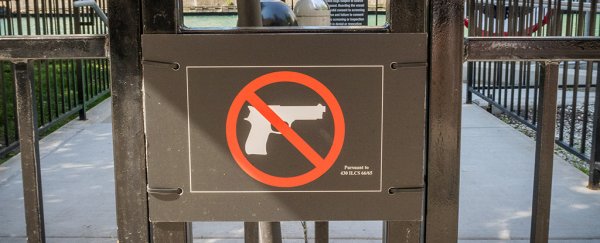As gun violence reaches record highs in the US, the trigger finger of blame twitches for easy explanations.
Mental illness is never far from the conversation in spite of a want of evidence. And it's not for lack of looking, either.
Now, another new study not only once again shows there's zero correlation between mental illness and shootings, but it also finds far better predictors for gun violence that are shockingly mundane.
Researchers from the University of Texas Medical Branch (UTMB) weighed in on a debate that has divided not just America, but much of the world.
Their conclusion isn't surprising, but is worth repeating. Having a mental health diagnosis – whether it's a mood disorder, PTSD, borderline personality disorder, or schizophrenia – doesn't make you more likely to threaten somebody with a gun.
What does? Simply knowing you have access to a weapon.
The statistics on gun violence in the US are chilling. While violent crime has fallen sharply over the past quarter century, 2017 saw more gun deaths than any year in decades.
More US citizens have been killed by guns since 1970 than all US servicemen and women killed in all foreign wars combined. We're talking tens of thousands every year. The tally for mass shootings in 2019 already stands at more than two dozen.
Nobody is arguing that the numbers don't reflect a crisis. Finding ways to hold onto precious freedoms that represent national identity without compromising safety is the sticking point.
To risk oversimplifying, the tension over the problem boils down to two opposing views, summed up in the idiom "guns don't kill people, people kill people".
The phrase has an equivalent in the academic world – dangerous weapons don't kill people, dangerous people do.
"The dangerous people framework suggests that the group of people with mental illness should be responsible for gun violence," write UTMB behavioural health researchers Yu Lu and Jeff R.Temple.
"Whereas the dangerous weapons framework suggests that the responsibility is in the widespread access to guns."
It's not hard to see the appeal of the dangerous person prognosis as a convenient way to keep guns out of the hands of the 'bad guys'.
The assumption isn't hypothetical either – the past decade and a half has seen a significant increase in state laws keeping guns out of the hands of people involuntarily admitted for mental health treatment.
Evidence supporting such legislative action is thin on the ground thanks in some part to the relative scarcity of research on gun violence in general.
"Much of the limited research on gun violence and mental illness has focused on violence among individuals with severe mental illnesses or rates of mental illness among individuals arrested for violent crimes," says Lu.
Focussing on a narrow section of the population risks selection bias, so to get a bigger picture, Lu and Temple collected survey data on 663 volunteers partaking in a long-term study on firearm use.
All were asked questions on gun ownership and their mental health history.
"Counter to public beliefs, the majority of mental health symptoms examined were not related to gun violence," says Lu.
There were some notable exceptions. Hostility, for example made an individual 3.5 times more likely an individual would have used a firearm to threaten another person.
While considered a characteristic that can influence certain mental health diagnoses, on its own hostility doesn't constitute an illness.
By far the most significant clue to a propensity for gun violence is simply knowing where you can get your hands on a firearm. Those who answered "do you have access to a gun if you needed or wanted one?" to the affirmative were 18 times more likely to have used one to threaten violence.
There's a lot to unpack in such a simple, unsurprising statistic. Those who know where to get a gun could be more likely to be immersed in a culture of firearm use, for example.
The study has a few limits to keep in mind. While the sample population itself was well mixed and of a decent size, just a small fraction of the participants had ever used a gun to make a threat. Surveys also suffer from their own problems in accurate and honest reporting.
To the researchers, the message remains crystal clear. The best obstacle to gun violence is distance.
"Taking all this information together, limiting access to guns – regardless of any other mental health status, demographics or prior mental health treatments – is the key to reducing gun violence," says Temple.
At best, profiling individuals with a mental health condition as a violent risk wastes resources and provides false security that does nothing to address actual causes.
The cost is likely to be far greater, promoting stigma that ostracises and prevents those experiencing problems from seeking help.
It's time we did away with the 'crazy' talk.
This research was published in Preventive Medicine.
